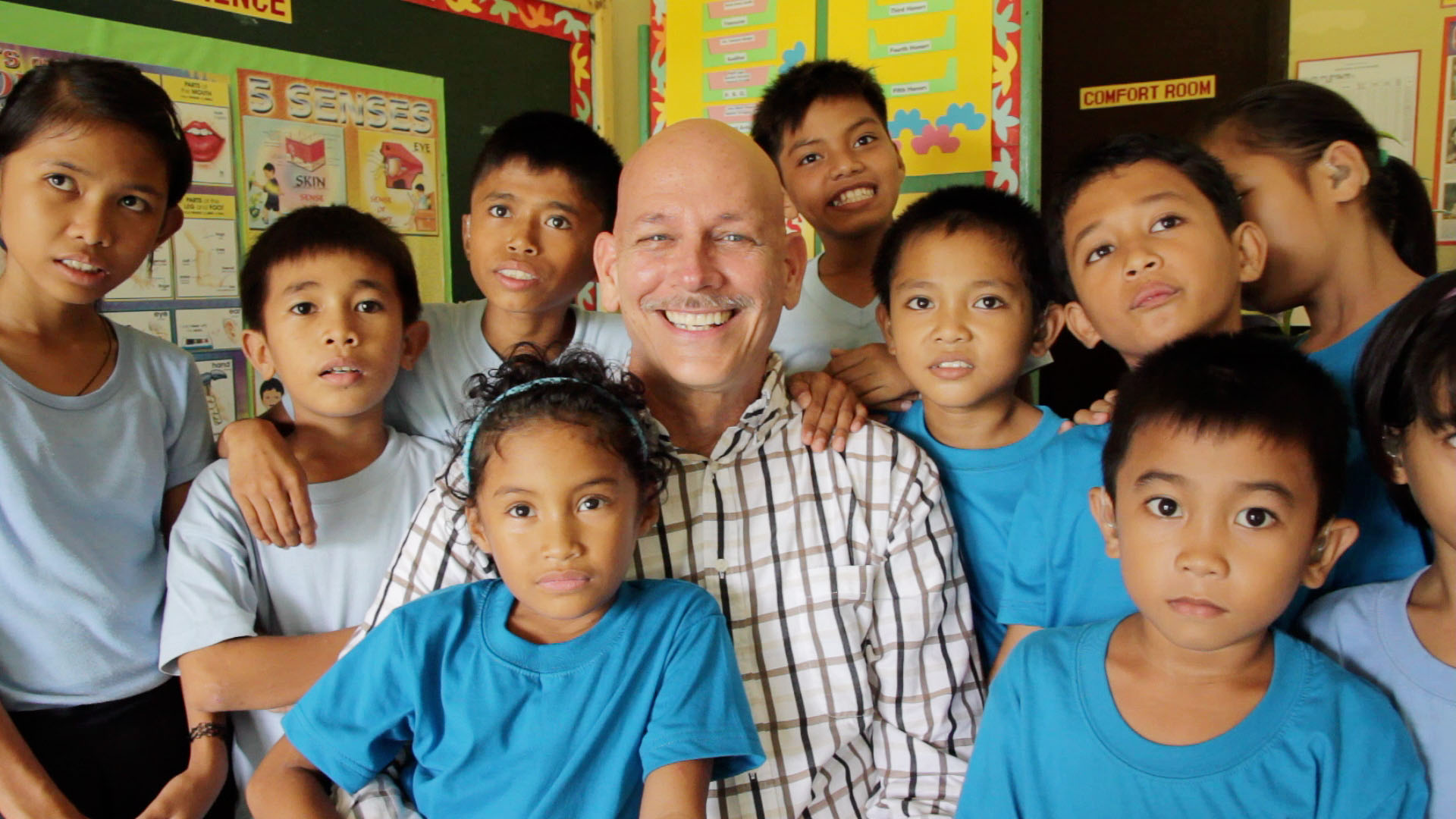
Dennis Drake became interested in sign language while attending Montana State University where he received his Bachelor of Science degree in Film and Television Production, cinematographer. During one semester Dennis had what he deemed to be a particularly heavy academic load so decided to take a “light” elective course. He chose pottery and attended the first class only to find that enrollment had been closed because of the large number of students. Dennis searched for another “easy” class and came across AMERICAN SIGN LANGUAGE. He decided that must be a snap and attended his first class. Dennis had an immediate affinity to the language of the hands. Within weeks of joining the class, Dennis was asked to join a group known as the Theater of Silence.
This small group of students / performers had been organized by Dr. Jack R. Olson, a remarkable professor at Montana State University. The group toured deaf schools across the western half of the U.S. presenting entertaining programs for hearing and deaf audiences. This was a totally volunteer effort and the troop only spent about six weeks a year on the road. Dr. Olson kept this group with different students going for about 20 years. This experience seems to have set a stage in the life of Mr. Drake that would one day take him a whole new direction. It should have followed that Dennis ended up working either as a wildlife cinematographer or working in a documentary film company but instead he spent the next 9 years of his life working in the print media as a graphic artist. This was not a profession he felt lead to nor was extremely talented at . . .just work.
Dennis with Peace Corps Team 1981
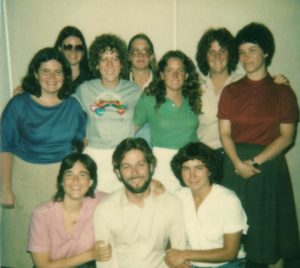
The shock of ending up for two months in Manila, the capital of the Philippines boasting a population of almost 12 million people at the time, was almost enough to end Dennis’ Peace Corps ambition before it began. The culture shock was intense. When given the choice of an established deaf program or a pioneering assignment on one of the smaller islands, Dennis took the undeveloped offer without hesitation. The next thing he knew he was standing on the island of Bohol, shoulder to shoulder with another Peace Corps volunteer, John Fisher.Being somewhat of an idealist, Dennis reached a realization that chasing the “American Dream” wasn’t all that it was cracked up to be. At 30 years old he decided to make a 180 degree change in his life’s direction and joined the Peace Corps. Falling back on the minor in sign language he had received in college, Dennis was enlisted as a “deaf education specialist”. After waiting almost a year for his assignment, he finally found himself winging his way to the Philippines . . . a place he had to look up in the world atlas because he didn’t have a clue where it was. He imagined it to be like Tahiti . . . a very attractive thought.
John Fisher with 1st class of deaf children in Tagbilaran, Bohol 1982
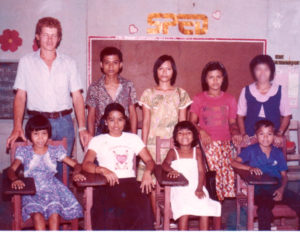
John had already been on the island for two years and knew the culture and lay-of-the-land very well. Somewhat of an eccentric fellow, John usually wore Mickey Mouse T-shirts, shorts, flip flops, rode a Honda 70cc motorcycle, slept under a dining table, and had a monkey or two on his shoulder. John and Dennis became the best of friends. John had met a teacher of the Deaf and 5 students a year before. It was for this small class that John had made a request for a deaf education specialist. After just a few weeks on the island and realizing it had a population of 1 million people, Dennis told John that there were probably 400 or more profoundly deaf young people on the island. The one teacher and class of five students was just a token attempt by the government to show that they cared about this group of forgotten disabled children. The only other deaf that could be seen around town were begging around the church yards. Others were hidden in the family’s homes. Deaf were thought by most everyone to be mentally retarded. Often hearing kids would throw rocks at deaf kids and laugh. It was a sad situation.
Together John and Dennis came up with a plan to make education available to the 400 deaf children. The plan called for Dennis to train education majors at the local college in sign language, lobby the government to open more classes, locate the deaf children, find funding to bring the children to the classes, and begin training the older students in vocational skills. Of course it was very simplistic of both men but it followed the old saying, “Fools rush in where angels fear to tread”.
Garden Cafe, Tagbilaran, Bohol 1984
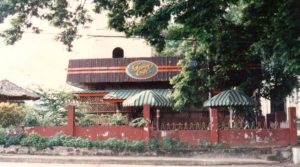
In two years time, the program had grown to 60 students and the Peace Corps duo had opened up the Garden Cafe, a small bamboo snack center in the town of Tagbilaran to offer vocational training for the students. It was at this time that John finished his tour of duty with the Corps and Dennis was on his own. The following year Dennis decided that he was just having way too much fun helping establish this deaf culture to leave so stayed “unofficially” for another year beyond his Peace Corps contract. During this time he married his soul mate whom he had met in Bohol. When Dennis and his wife left for the States in May of 1985, it was uncertain if they would return.
Dennis Drake, Bohol 1982
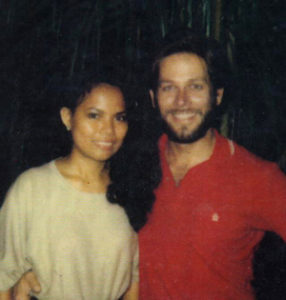
Once back in the U.S. Dennis realized that he would really like to continue the work he had started in Bohol so established the International Deaf Education Association (IDEA) Philippines in December of 1985. This non-profit foundation was to help Dennis channel donations back to Bohol to pay for the cost of bringing the deaf children in from the country side and mountains to attend school and provide teachers.
IDEA Philippines could not have survived without the dedication and talent of its co-founder, Mrs. Drake. She has worked tirelessly most of her life serving the deaf children of Bohol.
In the years that followed, Dennis and his wife had two sons, Aaron and Andrew. They had the unique experience of growing up with exposure to three different cultures, American, Filipino, and Deaf. Although mostly living in Bohol, the Drakes made frequent trips back the States to search out funding and to be with Dennis’ parents, Vernon and Bettie Drake.
(link to VERNON DRAKE family history)
(link to VERNON DRAKE’S last project)
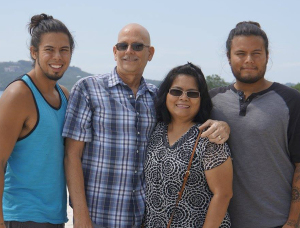
After many years of wonderful struggle and sacrifice, the Bohol deaf culture is well established. The deaf leadership has becoming stronger and the entire hearing population of Bohol has pretty much changed their attitude about the Deaf. Many hundreds of deaf children are in school and 200 plus deaf adults are employed and have families of their own. The Deaf did not marry before. The Deaf have developed a very close community. It has been more than 35 years since Dennis went to Bohol. In that 35 years, hundreds of friends from many nations have lent their financial support and talents to the work in Bohol.
